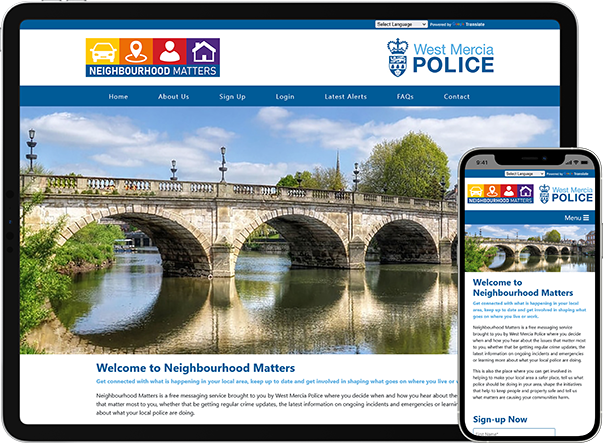Welcome to Neighbourhood Matters
Find out what's really happening in your area and keep in touch with West Mercia Police through our free messaging service.
The Neighbourhood Matters messaging system enables residents, businesses and community groups to keep in touch with local policing teams. You can receive updates on crimes, latest information on on-going incidents and learn more about what we're doing in your community.
You're invited to sign up and become a registered recipient of messages of information, crime alerts or witness appeals local to the area in which you live or work by email, text or telephone.
Don't worry, we won't bombard you with every incident. You can choose exactly the type of alert you wish to receive.
We'd really like to hear from you so why not ask your family, friends and colleagues to register too? Let’s get talking!
Please note that this service is not for reporting crimes or incidents – to make a report please contact West Mercia Police via the West Mercia Police website or dial 999 in an emergency.
Sign-up Now

Look up your local Safer Neighbourhood Team
Find your local Safer Neighbourhood Team and be able to contact them directly by entering a street address or postcode below:
Latest West Mercia Alerts
Catalytic Converter thefts
Dear resident On Thursday 25th April 2024 between 10am & 1pm, Officers from The Cuckoo Oak &...
A Royal Visit
Ellesmere was privileged today to have received a visit from HRH Princess Anne. HRH Princess Anne ...
HRH Princess Anne visits Ellesmere
Oswestry SNT have been attending the visit of HRH Princess Royal today. Very well attended and a mem...
Royal Visit
Oswestry SNT have been attending the visit of HRH Princess Royal today. Very well attended and a mem...
Click here to see more Alerts










